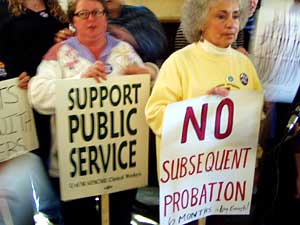|
Audio
Photos
More from MPR
Your Voice
|
Clerical workers authorize strike at University of Minnesota
October 3, 2003
 |
| The strike vote affects union members on the Twin Cities, Crookston and Morris campuses and the Duluth campus, which is represented by a separate union local. (MPR Photo/Tim Pugmire) |
Minneapolis, Minn. — Local 3800 of the American Federation of State, County and Municipal Employees represents about 1,800 clerical workers at the University of Minnesota. Union leaders say 88 percent of their members cast ballots this week, with 63 percent voting to reject the contract offer and authorize a strike. The vote affects employees in the Twin Cities, Crookston, Duluth, and Morris.
Union President Phyllis Walker says the "no" vote was an act of courage.
"We're the lowest paid among the university's workforce. We're 93 percent women. We are single parents, and many of us are forced to work two or three jobs just to put food on the table to feed ourselves and our families," she said.
Walker says the median wage for clerical workers is $14.20 an hour. The rejected two-year contract offer would have frozen salaries for one year. The second year had a 2.5-percent increase. But union leaders say increased health care costs which employees would have to pay would create the same effect as a pay cut.
Stefanie Yorek works in the U of M Department of Surgery and lives with another university clerical worker. She says the contract offer would have cut $3,000 from their combined household income of $50,000.
"Essentially the university is asking just me alone to work three weeks for free for the university, compared to what I got paid last year. So, it's basically a pay cut of three weeks, and I live pay check to pay check," she said.
The vote allows union leaders to call a strike after a 10-day notice. Phyllis Walker says a decision will be made sometime next week to set a date. She says if a strike is necessary, it will cause a lot of pain on the university.
"That's not what we want to do. We love the University of Minnesota. And we care very much about the students that we deal with day after day, but the administration leaves us no choice. We have to let them feel the empty positions at the University of Minnesota and what it's going to bring to them. We have to let them know how important we are."
Walker says she hopes the strike vote prompts university negotiators back to the bargaining table with a better contract offer.
U of M President Robert Bruininks says the administration is willing to talk, but warns the negotiations will be tough. State lawmakers cut funding to the university this year by $185 million over two years. Bruininks says a better offer would result in more employee layoffs.
"I'm not going to be too thrilled with any new ideas that will spend money we don't simply have. We have at least a $20 million hole in our budget next year that we still have to solve. So, I expect these negotiations will be civil, but they'll be very, very difficult. There simply isn't money I think to come up with a much more generous settlement," according to Bruininks.
There's also no recent experience at the U of M for dealing with a work stoppage. Carol Carrier, the university's vice president of human resources, says that last strike she's aware of was in the 1940s. Carrier say she hopes this threat can be avoided, but preparations are underway.
"That means that our colleges and business units and others have had to think about how they might get essential functions covered and so on if we do have people not at work. And that has been underway and good progress has been made," she said.
Two other university bargaining units voted this week to accept contract offers. The Teamsters represent 1,400 employees, while the AFSCME technical unit includes 1,100 workers.
|
News Headlines
|
Related Subjects
|
